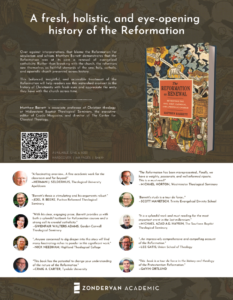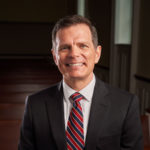
Natural Theology and Cornelius Van Til
Natural theology once occupied a welcomed place in the Reformed tradition until twentieth century theologians rejected it. Cornelius Van Til was one of natural theology’s loudest critics.  Van Til once wrote in a letter to Francis Schaeffer: “I think you will agree, then, that no form of natural theology has ever spoken properly of the God who is there.”[1] Van Til believed that natural theology has no place in Reformed theology.[2] This is a sentiment that has echoed in the writings of Van Til’s disciples. For example, Richard Gaffin says, “Natural theology may have a place in Roman Catholic and Arminian theologies—with their semi-Pelagian anthropologies and qualified optimism about the unbeliever’s capacity to know God—but not in a theology that would be Reformed.”[3] And yet, Reformed theologian Petrus Van Mastricht makes the antithetical claim: “So Christian, revealed theology does not exclude natural theology.”[4] Van Til sounds quite clear in his rejection of natural theology but he does admit a certain type of natural theology: he pits the natural theology of the historic church against his own version of natural theology. What caused Van Til to reject classic natural theology? More importantly, was Van Til correct to pit classic natural theology against a supposedly Reformed version of it?
Van Til once wrote in a letter to Francis Schaeffer: “I think you will agree, then, that no form of natural theology has ever spoken properly of the God who is there.”[1] Van Til believed that natural theology has no place in Reformed theology.[2] This is a sentiment that has echoed in the writings of Van Til’s disciples. For example, Richard Gaffin says, “Natural theology may have a place in Roman Catholic and Arminian theologies—with their semi-Pelagian anthropologies and qualified optimism about the unbeliever’s capacity to know God—but not in a theology that would be Reformed.”[3] And yet, Reformed theologian Petrus Van Mastricht makes the antithetical claim: “So Christian, revealed theology does not exclude natural theology.”[4] Van Til sounds quite clear in his rejection of natural theology but he does admit a certain type of natural theology: he pits the natural theology of the historic church against his own version of natural theology. What caused Van Til to reject classic natural theology? More importantly, was Van Til correct to pit classic natural theology against a supposedly Reformed version of it?
The short answer to this question is, no. Van Til’s rejection of classic natural theology rests on a misunderstanding of historic Reformed teaching and, at best, introduces confusion to Reformed theology, and at worst, represents a misreading of Scripture. To defend this claim, we must first understand Van Til’s critique of classic natural theology. Second, I critique Van Til’s view. Third, I conclude with brief observations concerning the importance of natural theology. Van Til’s rejection of classic natural theology rests on a misunderstanding of historic Reformed teaching and, at best, introduces confusion to Reformed theology, and at worst, represents a misreading of Scripture. Click To Tweet
Van Til’s Critique of Classic Natural Theology
Geerhardus Vos provides a succinct definition of natural theology that assists us with the examination of Van Til’s critique: “A teaching concerning God—that takes its content and method from nature.”[5] With this definition in hand, we have a reference point to understand why Van Til rejected classic natural theology. There are two chief reasons behinds Van Til’s rejection: (1) it represents sinful autonomous humanity’s efforts to say something true about God apart from God’s revelation in Scripture, and (2) it fails to preserve the organic unity of revelation.
First, Van Til believed that a person had to start from Scripture to obtain truth about God. If sinful people start from autonomous human reason, then they can never attain true knowledge of him. In his letter to Schaffer, Van Til wrote: “None of the great Greek philosophers, like Plato and Aristotle, and none of the greater modern philosophers, like Descartes, Kant, Hegel, or Kierkegaard and others, have ever spoken of the God who is there.”[6] Because these philosophers begin from autonomous reason, they say false things about God. Not even when Christian theologians correct the misapprehensions of the philosophers do they remedy the inherent problems with natural theology. Theologians like Thomas Aquinas try to combine the oil of autonomous reason with the water of scriptural revelation and thus compromise the purity of divine revelation. Van Til calls this type of thought synthetic thinking because it tries to combine the sacred and profane, revelation with rebellion.[7] Rather than mongrel natural theology one must begin with the “self-attesting Christ speaking in the Scriptures.”[8] Van Til goes as far as to say, “We must really do what Karl Barth has insisted that we must do but has not done, namely, start our interpretation of the whole of life von oben [‘from above’]. We must begin our meditation upon any fact in the world in the light of the Son of God, the light which is as the light of the sun, the source of all other light.”[9]
Second, Van Til picks up the idea of the organic unity of revelation from Herman Bavinck.[10] All of God’s revelation both in nature and Scripture is an organic whole and thus no one can employ the natural apart from Scripture: “The revelation in the world of nature was at no time sufficient or clear in itself apart from the Word revelation of God to man.”[11] No one can take a portion of God’s revelation in nature or in Scripture—he must accept Christ’s interpretation of the whole cosmos in toto.[12] Van Til presses his point to say, “Man never could, even before the fall, read nature properly, without supernatural thought communication.”[13] Thus, whether pre- or post-fall, there is no revelatory truth apart from the whole truth—natural theology is the fool’s errand to attain some truth apart from Scripture and is doomed to failure.
Despite Van Til’s strong rejection of classic natural theology, he promotes his own view of natural theology. First, in reaction to John Calvin’s claim that unbelievers can understand earthly things but regarding heavenly things they are blinder than a mole, Van Til believed Calvin was wrong: “Even Calvin . . . did not bring out with sufficient clearness at all times that the natural man is as blind as a mole with respect to natural things as well as with respect to spiritual things.”[14] Yet, Van Til could also admit, “The natural man is not blind in every sense.”[15] In other words, Van Til clouds his claims with confusing counter-claims. If the natural man is not blind in every sense, then how can he be blind as a mole? John Frame has noted that there are deep tensions in Van Til’s thought at this point.[16] Van Til clouds his claims with confusing counter-claims. Click To Tweet
Second, Van Til does admit a form of natural theology so long as it is properly wedded to Scripture, what he believes is a unique Reformed understanding of natural theology. In his judgment, the Westminster Confession of Faith contains such a natural theology when it opens with these words: “Although the light of nature, and the works of creation and providence do so far manifest the goodness, wisdom, and power of God, as to leave men unexcusable . . .” (I.i). Van Til claims that the Confession’s natural theology is entirely different than the natural theology of Aquinas because it is so interwoven with Scripture.[17] Given Van Til’s understanding of the organic and inseparable character of natural and special (Scripture) revelation, he judges the Confession teaches his view, a distinct Reformed understanding of natural theology.
A Critique of Van Til’s View
Van Til’s misunderstanding of natural theology rests upon three errors: (1) historic Reformed theology does not engage in synthesis thinking when it employs classic natural theology; (2) Van Til misunderstands Bavinck’s idea of the organic nature of revelation; and (3) Van Til erroneously pits the natural theology of the Westminster Confession against the views of Aquinas and the larger catholic tradition.
First, historic Reformed theology (and in the main we can also include the catholic, or universal, church), does not engage in synthesis thinking in its natural theology. Must we always start with the self-attesting Christ of Scripture to interpret every fact in the creation? The historic Reformed tradition never articulates anything like this because the notion finds its origins not in Scripture but in the philosophy of Immanuel Kant. Van Til believed that Kant brought a Copernican Revolution to philosophy that allowed Christians for the first time to contrast Christian with non-Christian thought: “This is the significance of Kant’s ‘Copernican Revolution.’ It is only in our day that there can therefore be anything like a fully consistent presentation of one system of interpretation over against the other. For the first time in history the stage is set for a head-on collision. There is now a clear-cut antithesis between the two positions.”[18] Van Til’s point is, in principle (their starting points), autonomous reason versus Scripture, there is a head-on collision, an antithesis, and thus under these circumstances, there can be no alliance between Cain and Abel, or Belial and Christ. Scripture, however, does not speak in these terms at every point.
Van Til believed that Kant brought a Copernican Revolution to philosophy that allowed Christians for the first time to contrast Christian with non-Christian thought. Click To Tweet Paul, for example, writes: “For the wrath of God is revealed from heaven against all ungodliness and unrighteousness of men, who hold the truth in unrighteousness” (Rom. 1:18, KJV). I purposefully quote the KJV here because it captures the nature of the term κατέχω (katecho), “hold” rather than newer twentieth-century translations that say unbelievers “suppress the truth” (e.g., ESV).[19] In other words, even in humanity’s fallen state they possess the truth of the knowledge of God’s existence and as Paul explains, they know of God’s invisible attributes, “namely, his eternal power and divine nature, have been clearly perceived, ever since the creation of the world, in the things that have been made” (Rom. 1:20, ESV). Evidence that unbelievers possess the truth appears in Paul’s interaction with the philosophers at Mars Hill when he positively quotes Stoic philosophers. Noteworthy is that when Paul evangelized the Jews, Paul “reasoned with them from the Scriptures” (Acts 17:2) but when he spoke to the Gentile philosophers he did not begin with the self-attesting Christ of Scripture but with the doctrine of creation and the truths that the unbelievers knew: “‘In him we live and move and have our being’; as even some of your own poets have said, ‘For we are indeed his offspring’” (Acts 17:28). In the first quotation Paul appeals to Epimenides and in the second Aratus. Why did Paul quote these poets? Because in Calvin’s assessment, “Such sayings of the poets came from no other fountain save only from nature and common reason.” And even though these quotations came from error-laden contexts, this “ought not to have hindered Paul from retaining a true maxim, though it were corrupt with men’s fables.”[20] Van Til errs because he argues that believers “suppress” the truth rather than “hold” it as Paul explains in Romans 1:18.[21]
Second, Van Til misunderstands the nature of Bavinck’s organicism. Bavinck promotes the idea of organism, an idea with origins in Romantic philosophy, especially that of G. W. F. Hegel. Organicism, or holism, is the belief that everything is part of a unified whole. Bavinck employs the idea to maintain the unity of divine revelation—natural and special. However, in contrast to Van Til, Bavinck does not press the organic unity of revelation to the point that he says that natural revelation cannot function apart from special revelation.[22] In fact, Van Til detects the difference when he chides Bavinck: “He himself has told us again and again that dogmatics must live by one principium only. It is difficult to see how dogmatics is to live by one principle if it is not the same principle that is to guide our thinking both in theology and in other science.”[23] In other words, Van Til takes issue with Bavinck because he does not promote the idea that humans require Scripture to interpret every fact in the world. Moreover, unlike Van Til, Bavinck does not claim that even in the pre-fall state Adam required special revelation to make sense of natural revelation. Reformed theologians certainly say that natural and special revelation work in concert and that in the pre- and post-fall state both are necessary, but not to the extent that natural revelation is utterly unclear apart from special revelation. Such a notion contradicts Scripture and rubs against the grain of Romans 1:18 as noted above.[24]
Van Til errs when he pits the natural theology of the Westminster Confession against that of Aquinas and the wider catholic tradition. Click To Tweet Third, Van Til errs when he pits the natural theology of the Westminster Confession against that of Aquinas and the wider catholic tradition. All one has to do is survey the works of Reformed theologians from the sixteenth and seventeenth centuries to see that, in general, they agree with Aquinas and the catholic tradition on natural theology. Turretin, Junius, Bucanus, Westminster divine Arrowsmith, and Matthew Barker, for example, all draw upon Aquinas’s proofs for the existence of God.[25] Additionally, the Reformed tradition is explicit in its agreement with Aquinas on the idea of common notions, that all people possess the natural knowledge of God and his law. Van Til rejected any idea of commonality with Rome on common notions.[26] And while Calvin did not use Thomas’s proofs in his Institutes, he first introduces the natural knowledge of God in the opening six chapters of his work before he invokes the topic of Scripture, a fact obscured by the Battles edition of the Institutes. The Battles edition adds forty-three Scripture references that are not original to Calvin’s 1559 edition in the opening six chapters.[27] Calvin also positively cites Cicero’s arguments for the existence of God in these opening chapters to show that all people possess the “seed of religion.”[28] In short, Van Til’s claim is unpersuasive because of the overwhelming counterevidence. Examine the works of Musculus, Vermigli, Perkins, Polanus, Du Moulin, Ussher, and Westminster divines Twisse, Rutherford, Tuckney, and Goodwin.[29] They all appeal to natural theology. Van Til’s claim has no basis in fact.[30]

